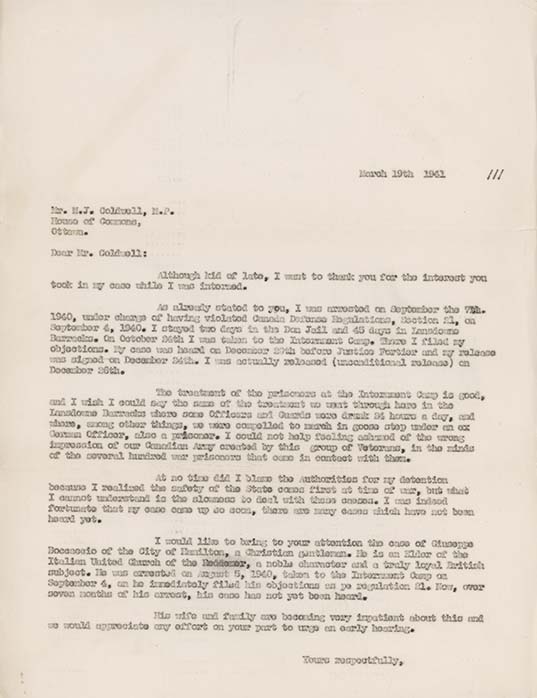Newest
internment, black and white, internee, photograph, document, internment & release, internment operations, petawawa internment camp, letter, internment camp, internees, mail, petawawa, toronto, portrait, camp life, correspondence, ruggero bacci, outdoors, italy,
Popular
black and white, camp, camp life, correspondence, document, family, family life, female, fredericton internment camp, internee, internees, internment, internment & release, internment camp, internment operations, italian canadian, italian canadians, italy, letter, libero sauro,
See all tagsTags
political life, mail, m.p., m.j. coldwell, libero sauro, letter, lansdowne barracks, internment operations, internment & release, internment, giuseppe boccaccio, document, co-operative commonwealth federation, ccf
Add each tag separately.
RELATED
Collection objects
Internees
Letter from Libero Sauro, to M.J. Coldwell M.P., March 19, 1941
Letter from Libero Sauro, to M.J. Coldwell M.P., March 19, 1941.
Rev. Libero Sauro was arrested on September 7, 1940 and held at Don Jail before being transferred to Petawawa Internment Camp.
After his release, Sauro continued to help other internees and their families. As shown in this letter, he is advocating on behalf on internee Giuseppe Boccaccio.
M.J. Coldwell, an M.P. from the Co-operative Commonwealth Federation of Canada Party (CCF), had provided assistance in Sauro's own case, when contacted by Clementina, Sauro's wife. Internees were not charged with a crime and so not entitled to habeas corpus. However, under the the DOCR (Defence of Canada Regulations), after 30 days, internees could formally object to their detention to an advisory committee appointed by the Minister of Justice. The Minister of Justice then appointed a judge to review the internee’s case. This meant an examination of the RCMP’s evidence against the internee, meetings with the internee, and interviews with witnesses who could attest to the internee’s character. After this, the judge either recommended an internee’s release or continued internment to the Minister of Justice. Unfortunately, this process seemed beset with delays and some confusion in many examples. As a result, Sauro who was released unconditionally did so after 111 days of internment. Boccaccio would serve 598 days of internment.
This document forms part of a collection of documents and other materials donated by the Sauro family.
Accession#
ICEA2010.0008.0049
Maker
Date
March 19, 1941
Classification
Inscriptions
Recto: [t-b, l-r]: [typed] March 19th 1941 [three forward slashes] / Mr. M. J. Coldwell, M.P. / House of Commons, / Ottawa. / Dear Mr. Coldwell: / Although kid [sic] of late, I want to thank you for the interest you / took in my case while I was interned. / As already stated to you, I was arrested on September the 7th. / 1940, under charge of having violated Canada Defense Regulations, Section 21, on / September 4, 1940. I stayed two days in the Don Jail and 45 days in Lansdowne / Barracks. On October 24th I was taken to the Internment Camp. There I filed my / objections. My case was heard on December 20th before Justice Fortier and my release / was signed on December 24th. I was actually released (unconditional release) on / December 26th. / The treatment of the prisoners at the Internment Camp is good, / and I wish I could say the same of the treatment we went through here in the / Lansdowne Barracks where some Officers and Guards were drunk 24 hours a day, and / where, among other things, we were compelled to march in goose step under and ex / German Officer, also a prisoner. I could not help feeling ashamed of the wrong / impression of our Canadian Army created by this group of Veterans, in the minds / of the several hundred war prisoners that came in contact with them. / At no time did I blame the Authorities for my detention / because I realized the safety of the State comes first at time of war, but what / I cannot understand is the slowness to deal with these caases [sic]. I was indeed / fortunate that my case came up so soon, there are many cases which have not been / heard yet. / I would like to bring to your attention the case of Giuseppe / Boccaccio of the City of Hamilton, a Christian gentleman. He is an Elder of the / Italian United Church of the Reddemer [sic], a noble character and a truly loyal British / subject. He was arrested on August 5, 1940, taken to the Internment Camp on / September 4, an [sic] he immediately filed his objections as pe [sic] regulation 21. Now, over / seven months of his arrest, his case has not yet been heard. / His wife and family are becoming very impatient about this and / we would appreciate any effort on your part to urge an early hearing. / Yours respectfully,
Acquisition Method
Donation
Have something to share?
Add a comment, a picture or share a video. Share with us
































































